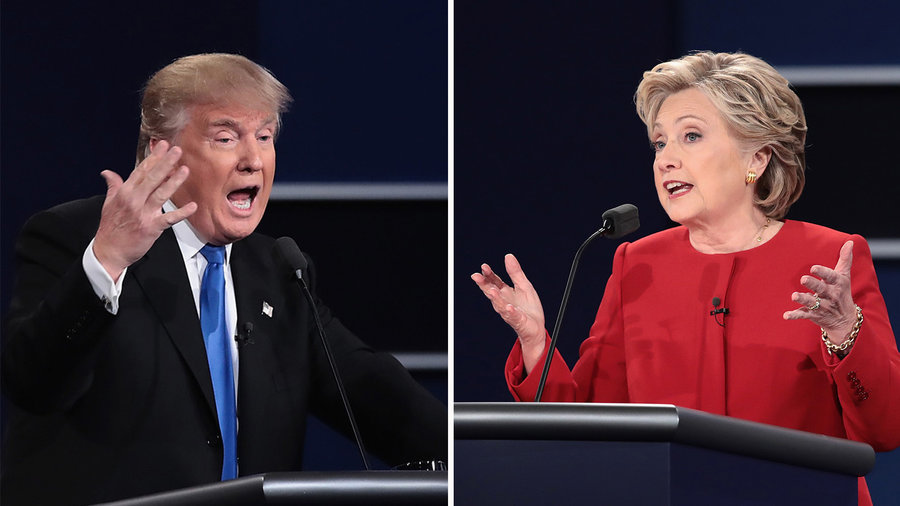On September 27th, the screening of the first US presidential debate in the Pav reached capacity 15 minutes before the debate was due to be aired. Arriving late, I stood outside trying to get a glimpse of the two candidates. Shuffling forward to get a better look, one thought struck me – this election is more significant than others.
Nearly 100 students – a combination of Irish and non-Irish – gathered to hear what Hillary Clinton and Donald Trump had said the previous night about why they should be elected as 45th president of the US. An audience that size wouldn’t assemble at Trinity’s student bar for a rugby international or even an All-Ireland final and definitely not an Irish election debate. But there it was.
Despite most in attendance not having a vote on November 8th, the result of any US election has repercussions not only in America but throughout the world. This time, there is a sense that, depending on the result, these repercussions could be considerably more far-reaching and detrimental than in previous years.
This election season has been the most volatile, distasteful and unpredictable in a generation
This election season has been the most volatile, distasteful and unpredictable in a generation. The Republican nominee continues to persevere despite making comments about women, immigrants and non-white US citizens that would have rendered any other presidential campaign void at this stage. Surprisingly, his support remains strong, with recent national polls suggesting that he trails Clinton by as little as three points. Although fresh revelations of lewd comments Trump made about women in 2005 look likely to have a major impact on his chances with leading Republican figures such as Senator John McCain and others rescinding their support for the party’s nominee.
Nonetheless, for someone with no experience of holding political office, these polling figures a month from the election are remarkable. In the wake of the Brexit referendum, I discussed how the result was driven by a strong anti-establishment and anti-globalisation sentiment on these pages. Trump has tapped into this same sentiment. His protectionist and isolationist policies have resonated with many blue-collar workers who feel betrayed by a “political elite” (that Clinton is seen to represent) who has, in certain cases, overseen US jobs being shipped overseas.
On the other hand, despite the Atlantic recently describing her opponent as “[possibly] the most ostentatiously unqualified major-party candidate in the 227-year history of the American presidency”, Clinton is struggling to significantly pull ahead. Even though she has spent much of her life advocating for progressive causes, her 20-plus years in the public eye has acted more as a handicap than an advantage to her campaign. Issues such as sending classified emails off a private email server and giving for-profit speeches to private firms such as Goldman Sachs has lead to understandable criticism.
A big determining factor in November’s election, that hasn’t been widely acknowledged to date, will be whether younger generations turn out to vote. When Barack Obama won in 2008 and 2012, he received more than 60 per cent of millennial votes. His victories saw record-breaking numbers of young people turning out to vote. Polls suggest that despite Clinton being the most popular candidate amongst millennials, her support is only half of what Obama received four years ago.
Considering much of Bernie Sanders’s support consisted of large swathes of young people, Clinton, in recent weeks, has announced proposals such as a rise in the minimum wage, increased funding for childcare, a greater focus on renewable energy and eliminating a large proportion of student debt from low-income families in an attempt to convert Sanders loyalists.
Ireland’s connection with the US is well established after centuries of emigration. Therefore, it is no surprise that people here will follow the campaign closely. A lesser-known connection between the two countries is the significant proportion of US nationals who study in Ireland. 8,000 Americans per annum choose to study here, while 4,000 come each year as part of study abroad programmes. This makes Ireland the ninth most popular destination for US students to study abroad in.
As a result, several thousands of US students will be in Ireland when the election takes place – not to mention those who have settled here permanently or even Irish citizens who hold US passports. Although it is not my place, as someone who is not a US citizen, to tell those who are which way they should vote, it seems evident that as the stakes are so high in this election, it is important that those who can do cast their vote.
A big determining factor in November’s election, that hasn’t been widely acknowledged to date, will be whether younger generations turn out to vote
Historically, the process of registering to vote overseas in US elections has been tedious and complicated. The website avaaz.org, a US-based civic organisation that promotes global activism, has made the registration process much more straightforward, however. The process can be done entirely online and consists of “registering, requesting a ballot and getting updates”, according to the website. Avaaz says that “only 12 per cent of Americans abroad vote” and claims that “8 million US citizens abroad could defeat Trump”.
Similar efforts have been seen in Trinity, with a group of students last Tuesday registering US citizens to vote and to apply for an absentee ballot (postal vote).
For this writer, the decision in November seems clear-cut. A candidate who has dedicated much of her life to public service and, for the most part, will pursue sensible centrist policies not far removed from her predecessor. Or a man who, more than likely, has paid no income tax for the last 20 years, says that “you can do anything to women when you’re a star” and has no grasp of policy and exacerbates racial tensions. Ultimately, students and younger generations will play a major role in this decision. Those who can vote should register and vote wisely.







